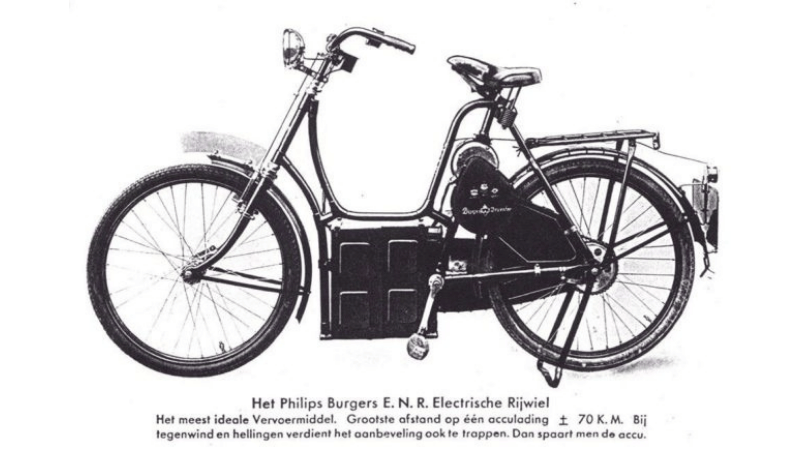Our Earth is so incredible. Our planet supports life for billions of people and astounds us every day with its beauty. With the busy hustle and bustle of everyday life it can be easy to fall into a routine that might not be the best for the environment, but small changes can have a huge impact on the planet and might even make your life better at the same time.
At Gazelle, we have been committed to sustainable mobility for over 130 years. As a Dutch ebike brand rooted in cycling culture, we know that electric bicycles aren’t just a convenient mode of transportation, they are a meaningful way to reduce emissions, improve public health, and reshape cities for the better.
This Earth Day, we’re taking a closer look at how riding an ebike helps protect the environment and promotes a healthier lifestyle for riders and communities alike. We invite you to slow down with us today and consider how you can make a difference.
Why Transportation Matters on Earth Day
The transportation sector accounts for nearly a quarter of global carbon dioxide emissions, with passenger vehicles being a major contributor. According to the U.S. Environmental Protection Agency, the average gasoline-powered car emits about 4.6 metric tons of carbon dioxide per year. These emissions contribute to global warming, air pollution, and public health challenges—particularly in urban areas.
Reducing our reliance on cars, especially for short trips, is one of the most impactful actions individuals can take. This is where ebikes come in.
eBikes vs. Cars: A Cleaner Way to Move
Electric bikes are dramatically more energy-efficient than cars. Even when accounting for the electricity used to charge them, ebikes emit a fraction of the carbon dioxide that a typical car produces. Research from the European Cyclists’ Federation found that electric bikes generate just 22 grams of CO₂ per kilometer or half mile. In contrast, a car emits around 271 grams per kilometer/ half a mile—more than 12 times as much.
The difference is especially significant for short urban trips. In many cities, over 50% of car journeys are under 3 miles or 5 kilometers. These are exactly the kinds of trips that could easily be replaced by ebike rides. Doing so not only cuts emissions but also alleviates traffic congestion and improves local air quality.
A study published in Transportation Research estimates that replacing just 15% of urban car travel with bike travel could reduce transportation-related CO₂ emissions by 11%. The environmental return on this change is enormous—especially when considered on a global scale.
Cleaner Air and Healthier Cities
Air pollution remains one of the biggest environmental health risks worldwide. The World Health Organization attributes millions of premature deaths each year to poor air quality, much of it caused by vehicle emissions.
By choosing an ebike over a car, you contribute directly to cleaner air in your community. Unlike motor vehicles, ebikes produce no tailpipe emissions and no noise pollution. This makes them ideal for dense urban areas, where residents are most vulnerable to the health effects of traffic-related air pollution.
The benefits are not just environmental—they’re social. Cities with more cyclists tend to have safer streets, lower noise levels, and more vibrant public spaces. The shift to cycling helps build communities that prioritize livability, sustainability, and human connection.
eBikes Support a Healthier Lifestyle
Electric bikes are not just good for the planet—they’re good for your body. Unlike cars or public transportation, riding an ebike requires physical activity. Although assisted by a motor, pedal-assist ebike riders still pedal and engage in cardiovascular exercise, often without realizing it.
A study published in the Journal of Transport & Health found that ebike users tend to ride more often and cover longer distances than traditional cyclists. This consistent activity can help improve cardiovascular health, support weight management, reduce stress, and enhance mental well-being.
Moreover, because ebikes make hills, headwinds, and longer distances more manageable, they are accessible to a wider range of people—including older adults and those with physical limitations. Plus with our classic step through frames offered on many of our models, it’s never been easier to mount your ride. This democratization of cycling leads to more people getting out of cars and onto bikes, further amplifying the benefits for both individuals and the planet.
A Closer Look at eBike Batteries and Recycling
One of the most common questions about ebikes is how sustainable their batteries really are. It’s a valid concern. Most ebikes are powered by lithium-ion batteries, which contain valuable and finite materials like cobalt, lithium, nickel, and copper. Ensuring these materials are handled responsibly at the end of a battery’s life is essential for a truly sustainable ebike ecosystem.
Fortunately, battery recycling technology and infrastructure have advanced significantly in recent years. In Europe, the Battery Directive mandates that manufacturers collect and properly recycle spent batteries. At Gazelle, we work with partners like Bosch, People For Bikes, and Call2Recycle, who specialize in battery recycling to ensure that used batteries are safely collected, processed, and repurposed.
As ebike adoption grows, so too does the need for effective battery recycling programs. At Gazelle, we are committed to doing our part by supporting take-back schemes, educating riders, and continuing to innovate with sustainability in mind.
In addition to batteries, the production of ebikes including their frame materials, does have an environmental impact and carbon footprint. As small efficient electric vehicles with the capability to replace car trips and car miles, an ebike’s impact of production can be offset in as few as 300 miles when you choose to make a trip by bike instead of by car.
A Better Future, One Ride at a Time
This Earth Day, we invite you to see your daily choices in a new light. Whether it’s your morning commute, a weekend trip to the market, or a scenic ride through town, choosing to add a little adventure to your day and travel by ebike is a decision that benefits both you and the planet.
By reducing emissions, improving air quality, and encouraging active lifestyles, ebikes are much more than a convenient transportation option, they are a tool for positive change. We are proud to be part of a movement toward healthier cities, cleaner air, and a more sustainable future.
We believe every ride makes a difference. And we’re glad you’re riding with us.
Sources
- U.S. Environmental Protection Agency. (2023). Greenhouse Gas Emissions from a Typical Passenger Vehicle. https://www.epa.gov/greenvehicles/greenhouse-gas-emissions-typical-passenger-vehicle
- European Cyclists’ Federation. (2011). Cycle more often 2 cool down the planet! Quantifying CO₂ savings of cycling. https://ecf.com/resources/cycling-facts-and-figures
- Redwood Materials. (2023). Redwood and Lime partner to recycle e-bike batteries and build a circular supply chain. https://www.redwoodmaterials.com/news/redwood-and-lime-partner-to-recycle-e-bike-batteries
- Castro, A., Kahlmeier, S., & Götschi, T. (2019). Health benefits of cycling: A systematic review. Journal of Transport & Health, Volume 14. https://doi.org/10.1016/j.jth.2019.02.004
5. Piatkowski, D., et al. (2021). E-bike travel behavior and the potential for carbon emissions reduction. Transportation Research Part D: Transport and Environment, Volume 96. https://doi.org/10.1016/j.trd.2021.102853



